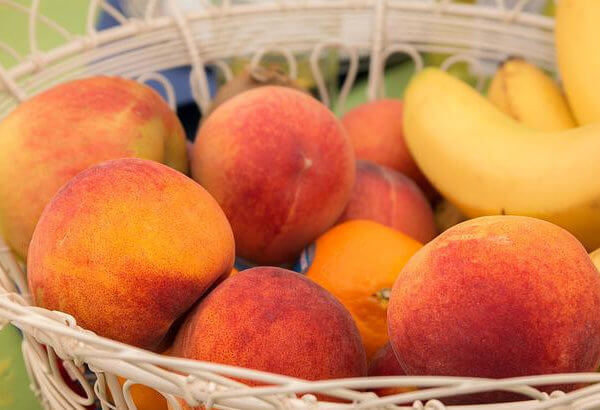
A Basket of Summer Fruit
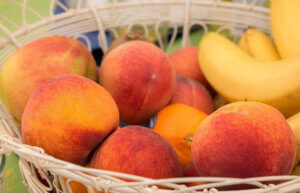 Jere and I received the extraordinary gift this week of a basket of summer fruit. Peaches — from Georgia, even — and they were perfectly ripe and juicy. I had fantasies at first of making this prize into peach preserves, saving this bright, sunny flavor to cheer our dour English muffins in dark December, or maybe remind us of sunshine in March’s freezing rain. Or possibly I’d make a peach cobbler, or one of those cool New York Times recipes for rolling sweet, juicy peach bits in prosciutto, or serving this summer fruit sliced alongside tomatoes.
Jere and I received the extraordinary gift this week of a basket of summer fruit. Peaches — from Georgia, even — and they were perfectly ripe and juicy. I had fantasies at first of making this prize into peach preserves, saving this bright, sunny flavor to cheer our dour English muffins in dark December, or maybe remind us of sunshine in March’s freezing rain. Or possibly I’d make a peach cobbler, or one of those cool New York Times recipes for rolling sweet, juicy peach bits in prosciutto, or serving this summer fruit sliced alongside tomatoes.
But these peaches will not survive the day. We’re eating them plain, greedily, and with their brilliant, succulent juices running onto our hands, in the wild abandon of a bunch of kids on summer vacation. I’ll remember the peaches’ intense, juicy, summer fruit flavor in December, when the sun begins to set at 4:30, to bring my thoughts back to God’s bounty and grace. A basket of summer fruit is more than just a snack or a treat or a dessert. It’s a basket of the very best of us — wholesome simplicity, sweet memories as rich and fresh as the juice running down my arm, and happy and full times of love and ease.
Prophets are Depressing
Maybe that’s why Amos begins his gloomy prophecy in our reading today with a basket of summer fruit. It’s hard to listen to prophets. They’re depressing, for one thing, always going on and on about gloom and doom, and the inevitable — they say — consequences of our failure to listen and heed their advice. And their warnings are so dire. Also, if we don’t listen carefully, translating their context into something we understand in our lives, we can lose the thread of what they’re trying to tell us. Take our friend Amos, for example. This is the same Amos of the plumb line from our Old Testament reading last week — Amos of the basket of summer fruit today. Even though it can sound like another time in a far-off, unfamiliar place that doesn’t have any meaning to us today, if you put Amos’s references into our context, his prophecy is, as they say on TV, ripped from the headlines. So what did Amos really say?
He’s calling out the values of a culture and an economy that has gotten distracted from God’s justice and love. Amos is telling us what happens when a society loses its connection with generosity, humanity, and grace and starts racking up points on the wrong scoreboard, and is worried and distracted by many things. Will I have enough? Will we be able to maintain our standard of living? How do we maintain our comfort and convenience with regulations protecting our economy and natural resources?
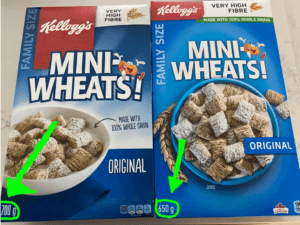 We will make the ephah small and the shekel great, Amos says of those who have veered away from God’s justice and mercy. They practice deceit with false balances, Amos says. Shrinkflation, as it’s called in the news, is difficult to see in real time at the grocery store, and that’s the whole point. Shrinkflation, where manufacturers don’t raise prices, but put less cereal, or fewer crackers, in a smaller box for the same price, is just one example of a slippery slope — that gradual and often unaware slide from a specific standard into a free fall of mal-adaptation. When we hit the bottom of the slide with a bump, we wonder how we got there and can no longer remember, identify, or return to the place where we started, or the person we were.
We will make the ephah small and the shekel great, Amos says of those who have veered away from God’s justice and mercy. They practice deceit with false balances, Amos says. Shrinkflation, as it’s called in the news, is difficult to see in real time at the grocery store, and that’s the whole point. Shrinkflation, where manufacturers don’t raise prices, but put less cereal, or fewer crackers, in a smaller box for the same price, is just one example of a slippery slope — that gradual and often unaware slide from a specific standard into a free fall of mal-adaptation. When we hit the bottom of the slide with a bump, we wonder how we got there and can no longer remember, identify, or return to the place where we started, or the person we were.
Pay Attention
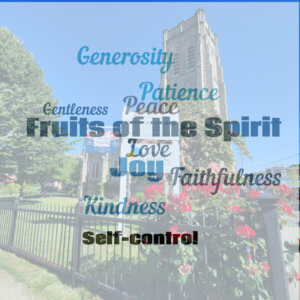 Is profit wrong? Of course not. That’s not what Amos is saying. Amos is telling us to pay attention — to remember God’s justice and mercy, and to make sure we don’t forget the basic human goodness that holds us all together. This is what Amos’s plumb line is for. The plumb line shows us which way is straight when our walls, our standards, and our lives have gone crooked, sometimes in such imperceptible ways over time that we can’t even begin to say when things began to change. Just like “going crooked” on a swing as a kid, it starts out just a little and increases with each oscillation, until all of a sudden you’re colliding with your neighbor on the next swing.
Is profit wrong? Of course not. That’s not what Amos is saying. Amos is telling us to pay attention — to remember God’s justice and mercy, and to make sure we don’t forget the basic human goodness that holds us all together. This is what Amos’s plumb line is for. The plumb line shows us which way is straight when our walls, our standards, and our lives have gone crooked, sometimes in such imperceptible ways over time that we can’t even begin to say when things began to change. Just like “going crooked” on a swing as a kid, it starts out just a little and increases with each oscillation, until all of a sudden you’re colliding with your neighbor on the next swing.
With the basket of summer fruit, Amos reminds us of those sweet fruits of the spirit — love, joy, peace, patience, kindness, generosity, faithfulness, gentleness, self-control — that can put us back into right relationship with God and with each other. We are spiritually and relationally starved without the fruits of the spirit. And the famine that Amos is talking about — the consequence of our failure to listen and our stray off plumb — is a famine of the fruits of the spirit. If we don’t keep that basket of summer fruit in mind in the cold, dark days of winter, when our own challenges and struggles overwhelm us, we will no longer hear the voice of God. If we’ve lost all sense of justice and mercy, we will no longer even recognize injustice when we see it, and we won’t be able to fix it.
Mary and Martha
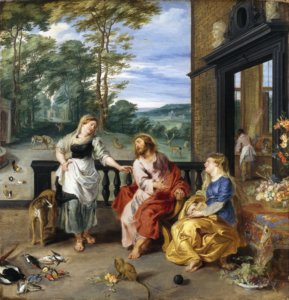 It’s the same with Mary and Martha. I love to cook and to share big family meals and I love to entertain. As a Martha myself, I’ve always bristled at Jesus’ response to Martha’s reasonable — in my view — request for a little help in the kitchen. Mary’s just sitting there, right? And the dinner is not going to cook itself, particularly over fire in the back yard. And yet Jesus tells Martha to stand down. Mary, he says, has chosen the better part, and it will not be taken from her. Ouch. That was always a judgment that hurt, and I couldn’t reconcile it with everything else I knew about Jesus, who, after all, prepared dinner all by himself for 5,000 people on short provisions without breaking a sweat, just the chapter before today’s reading in Luke’s gospel. Today, for the first time, Amos’s plumb line showed me where my understanding of Jesus’ words to Mary was at least 10 degrees off right relationship. The basket of summer fruit — the fruits of the spirit (love, joy, peace, patience, kindness, generosity, faithfulness, gentleness, self-control) — helped me to hear Jesus’ words in a new way.
It’s the same with Mary and Martha. I love to cook and to share big family meals and I love to entertain. As a Martha myself, I’ve always bristled at Jesus’ response to Martha’s reasonable — in my view — request for a little help in the kitchen. Mary’s just sitting there, right? And the dinner is not going to cook itself, particularly over fire in the back yard. And yet Jesus tells Martha to stand down. Mary, he says, has chosen the better part, and it will not be taken from her. Ouch. That was always a judgment that hurt, and I couldn’t reconcile it with everything else I knew about Jesus, who, after all, prepared dinner all by himself for 5,000 people on short provisions without breaking a sweat, just the chapter before today’s reading in Luke’s gospel. Today, for the first time, Amos’s plumb line showed me where my understanding of Jesus’ words to Mary was at least 10 degrees off right relationship. The basket of summer fruit — the fruits of the spirit (love, joy, peace, patience, kindness, generosity, faithfulness, gentleness, self-control) — helped me to hear Jesus’ words in a new way.
After Jesus’ own focus throughout the gospel on table hospitality, eating and drinking with sinners, it just can’t be that he is really saying that sitting still and listening at God’s feet is qualitatively better than — to be ranked and preferred over — the nurturing expression of love that comes of a shared meal, well prepared and lovingly served. What if Jesus is liberating all people, even women — even Mary — even Martha — with his words to Martha? Jesus just pulled out Amos’s plumb line, and Martha’s attention had gone way off plumb. Martha, Martha, you are worried and distracted by many things; there is need of only one thing.
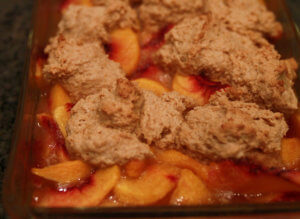
As Elizabeth Meyer Boulton writes, this story is not a critique of kitchen duty or the active life or just plain old getting things done. It’s a critique of worry and distraction. It’s a critique of being fragmented, of chasing after many things when there is only one thing. God is not against cooking or hosting or any activity that makes love possible. The only thing God is against in this picture is worry and distraction. Consider the lilies of the field, as we sang at Maris Humphreys’s celebration of life this week. The lilies grow but neither spin nor toil. They focus on their lily thing, and that is their plumb line. We just need to focus on our thing, and not get distracted. We can delight in God by listening and study. And we can delight in God by preparing and serving up the fruits of the spirit — the very, very best of ourselves — in a grand summer picnic. Maybe even with peach cobbler for dessert. Amen
